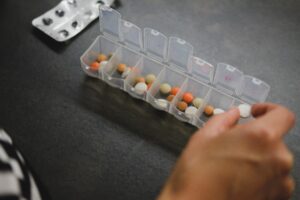En el verano de 2022, la Iniciativa de Salud Global (GHI) de Wabash College invitó a los estudiantes del curso «Salud Global» a Perú para trabajar con la Asociación Global Health Initiative Perú , y aprender sobre los desafíos de salud del país.
Uno de los retos de salud pública más apremiantes en Perú implica un virus transmitido por el mosquito Aedes aegypti como el virus del dengue. Los síntomas leves del virus incluyen náuseas, vómitos, erupciones cutáneas, fiebre, dolores y molestias musculares, y sólo pueden propagarse por mosquitos que contengan el virus, no de persona a persona.
En Perú, hubo un aumento significativo de casos registrados en 2022 y ya se han reportado más de 73.000 casos en 2023, lo que está en camino de ser la cantidad más alta jamás registrada en el país.
Para combatir esta enfermedad, el Ministerio de Salud de Perú ha estado haciendo varios esfuerzos, uno de ellos lo realiza el puesto de salud La Rinconada del distrito de San Juan de Miraflores, lugar de intervención de GHI Perú en donde los estudiantes de Wabash GHI tuvieron la oportunidad de colaborar.




El 1 de agosto de 2022, los estudiantes de Wabash apoyaron al Puesto de Salud Rinconada en encuestar y tratar el agua de las familias que viven en Pamplona Alta, Lima, con el fin de obtener información sobre la limpieza de la fuentes de agua, y evitar que se generen los mosquitos en ellas. Los mosquitos ponen sus huevos en zonas de agua estancada, por lo que estas fuentes fueron el principal objetivo de los estudiantes de Wabash para ayudar a erradicar y prevenir la enfermedad.
Los estudiantes de Wabash, miembros del Equipo GHI Perú y representantes de la Posta de Salud estuvieron caminando en pequeños grupos de 2-3 personas en diferentes comunidades de Pamplona Alta para inspeccionar las fuentes de agua y colocar larvicidas en sus recipientes.
Los grupos iban puerta por puerta preguntando a las familias si podían inspeccionar y tratar sus fuentes de agua. Los estudiantes anotaban en un papel el estado de las fuentes, por ejemplo si estaba almacenada en recipientes abiertos o cerrados, así como, información como la dirección de la vivienda, y datos personales. Se recogían muestras de cada recipiente y los alumnos observaban el agua en busca de huevos de mosquito.

Si se veían huevos de mosquito o si se almacenaba en recipientes abiertos, los alumnos trataban el agua para evitar que los huevos de mosquito crecieran en ella, siguiendo las instrucciones del personal de salud a cargo.
Sólo en ese día, el agua de cientos de hogares de Pamplona Alta fueron tratadas.
Este trabajo forma parte de un proyecto en curso que lleva a cabo el Ministerio de Salud de Perú, que no sólo se centraba en la inspección y el tratamiento del agua, sino también en la prevención de esta enfermedad.
Los estudiantes de Wabash aprendieron cómo los puestos de salud locales educaban al público para que cubrieran sus fuentes de agua almacenada siempre que fuera posible para reducir la prevalencia de mosquitos y prevenir el dengue.
Este día en Pamplona Alta fue una experiencia reveladora para los estudiantes de Wabash, ya que vieron de primera mano los retos y el trabajo necesario para hacer frente a un importante problema de salud mundial y pública.
Uno de los objetivos de la Iniciativa de Salud Global de Wabash es enseñar a los estudiantes sobre problemas de salud global, y permitirles servir en comunidades a escala global donde los desafíos de salud están presentes. Esta experiencia logró este objetivo y colaboró en la lucha en curso de prevención del virus del dengue en Perú.
Mitchell Keeling
Estudiante de Wabash College
Wabash College students collaborate in the prevention of dengue virus in Lima
In the summer of 2022, the Wabash College Global Health Initiative (GHI) brought global health students to Peru to work with GHI Peru and learn about the nation’s healthcare challenges.
Right now one of the most pressing public health challenges in Peru involves a mosquito-borne virus known as Dengue virus. Mild symptoms of Dengue virus include nausea, vomiting, rashes, fever, aches, and pains and can only be spread by mosquitoes containing the virus, not from person to person.
In Peru, there was a significant increase in reported cases in 2022 and more than 73,000 cases have already been reported in 2023, which is on track to be the highest number ever recorded in the country.
To combat this problem, the Peruvian Ministry of Health has been making several efforts, one of which is being carried out by the La Rinconada Health Post in the district of San Juan de Miraflores, a GHI Peru intervention site where Wabash GHI students had the opportunity to collaborate.
On August 1st, 2022, Wabash students supported the Rinconada Health Post in surveying and treating the water of families living in Pamplona Alta, Lima in order to obtain information about the cleanliness of the water sources and prevent mosquitoes from propagating in them. Mosquitoes lay their eggs in areas of stagnant water, so these sources were the main target for Wabash students to help eradicate the vectors of the disease.
Wabash students, members of the GHI Peru Team and representatives from the Posta de Salud walked in small groups of 2-3 people to different communities in Pamplona Alta to inspect water sources and to place larvicides in their containers. These larvicides of course did not negatively affect the drinking quality of the water for the people of the town.
The groups went door to door asking families if they could inspect and treat their water sources. The students wrote down on a data sheet the conditions of the water sources, for example whether the water was stored in open or closed containers, as well as information such as the address of the house and personal data. Samples were collected from each container and students observed the water for mosquito eggs. If mosquito eggs were seen or if water was stored in open containers, the students would treat the water to prevent mosquito eggs from growing in it, as instructed by the health personnel in charge.
On this one day alone, the water in hundreds of homes in Pamplona Alta was able to be surveyed and treated.
This work was part of an ongoing project conducted by the Peruvian Ministry of Health, which not only focused on surveying and treating the water, but also on educating the public on the disease. On top of helping people in the community, Wabash students also learned how local health clinics were educating the public to cover their sources of stored water whenever possible to cut down on the mosquito prevalence.
This day in Pamplona Alta was an eye-opening experience for the Wabash students, as they saw first-hand the challenges and work required to tackle a significant global/public health concern like Dengue virus in Peru.
One of the goals of the Wabash Global Health Initiative is to not only teach the students about global health issues, but to allow them to serve in communities on the global scale where health challenges are present. This experience certainly achieved this goal and supported the ongoing fight against Dengue virus in Peru.
Mitchell Keeling
Estudiante de Wabash College





